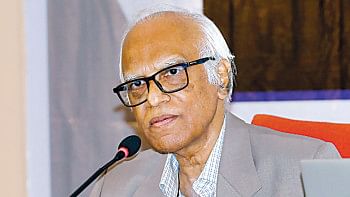Alokito Hridoy School and its innovative education model

Launched in 2016 in Gorai, Tangail, an area heavily populated by factories, Alokito Hridoy School (AHS) caters to 350 students, most of whom are the children of factory workers. The school uses innovative, project-based approaches, where students learn by investigating real-world challenges; game-based approaches, where students learn by playing local games; and social-emotional learning, where students learn self-awareness, management, and interpersonal skills. These approaches help to improve learning outcomes and student-teacher relationships and make the classroom environment joyful.
Locally recruited teachers are trained and coached to deliver their innovative pedagogy. For example, Ms. Shamima, a grade 4 teacher, inspired her students to identify the most pressing problems in their communities. With Shamima's guidance, Sharif, a shy student who struggled to articulate and voice his thoughts, organised a courtyard meeting, and convinced the village elders to protest to divert the factory drainage away from the pond near the school. Organising the courtyard meeting using a project-based approach helped Sharif build on his skills, such as creativity, critical thinking, problem-solving, communication, and collaboration.
Teachers use local games like hopscotch, Ekka Dokka, and Golap-Togor to teach students. For example, grade 3 students learn by jumping in circles drawn on classroom floors to identify parts of speech or layers of the earth. This game-based approach transformed classrooms into joyful spaces where the students jump, laugh, play, and learn. On some days, teachers design their games to teach more complex topics. And on other days, students take the lead in engaging their peers in games they designed.
To supplement the National Curriculum Board textbooks, AHS has designed workbooks, which serve as tools to improve learning through frequent practice and feedback. They have also developed low-cost animations to explain difficult topics using storytelling. Combining these innovative teaching-learning practices and tools has worked wonders in increasing student engagement and improving student learning outcomes.
AHS recognizes its teachers' efforts through awards such as Best Teachers. Additionally, students are evaluated and rewarded for achieving grade-level competencies outlined by the government curriculum and skills such as creativity, collaboration, problem-solving, communication, and social-emotional skills. A unique report was developed to account for both metrics.
Recognising parents as critical stakeholders, AHS engages parents in regular parent-teacher meetings to introduce them to the significance of creativity, problem-solving, and communication skills, in their child's development. In these bi-monthly meetings, parents share their views on improving their children's development. AHS also recognizes active parents yearly with the "Best Parent Award."
AHS events are held to encourage the development of skills in students. One such event is the STEM Fair, where students like Hafza, a grade 7 student, worked with her peers to build a prototype of a foot overbridge harnessing solar power for light at night.
You can be a part of Alokito Hridoy School's efforts to provide innovative education at a subsidised rate by contributing to its zakat campaign.


 For all latest news, follow The Daily Star's Google News channel.
For all latest news, follow The Daily Star's Google News channel. 



Comments